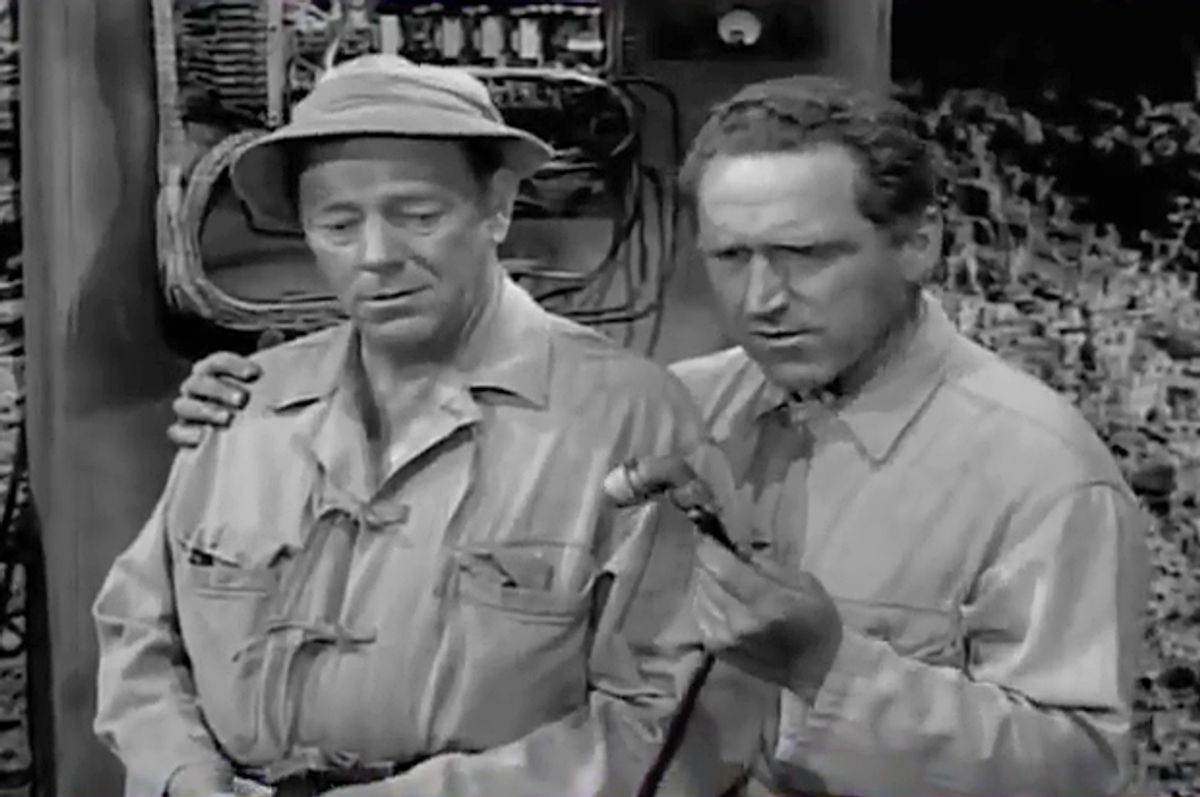On its surface, the "Twilight Zone" episode "On Thursday We Leave for Home" seems like a standard 1960s sci-fi story. A colony of 187 people is stranded on a hot, barren desert planet with nothing but the leadership of Captain William Benteen (brilliantly played by James Whitmore) to keep them alive.
When a rescue ship finally arrives to take them back to Earth, they believe their troubles are over — but Benteen, who has spent 30 years becoming psychologically dependent on being revered as a leader, gradually realizes that his own life will seem purposeless once the colony returns home.
A bit distant perhaps, but Rod Serling's teleplay is so nuanced a meditation on political power that "On Thursday We Leave for Home" is timeless enough to apply to today's news cycle.
The episode acknowledges how a powerful executive government can be indispensable in certain situations. When necessary, Benteen can be tough, punishing one colonist by ordering him to take an extra shift when the man's laziness inconveniences the rest of the group. He's also compassionate, telling eloquent stories about the beauties of Earth to comfort the group when they are distressed. Finally, he's inspiring, leading his crew in chants about how a rescue ship will soon arrive during a period of terrible tragedy.
In all, the episode takes its time to demonstrate how the colony would have lost hope and perished without Benteen's strong leadership, underlining and defining what exactly the integral qualities of a good, necessary leader are.
"On Thursday We Leave" also defines good leadership by highlighting its pitfalls and showing how power can be addictive to those accustomed to wielding it.
When Benteen realizes that his services are no longer needed — that, indeed, the crew of the rescue ship has now supplanted him in the coveted role of "leader" — he becomes less concerned about the colony's welfare and more about being perceived as still relevant and needed. He even starts making decisions and proposing actions that would actively harm both the other colonists and himself, all in the name of maintaining what little authority he has left.
A moment of crisis gives Benteen a choice of redemption or personal ruin. Ultimately, he fails.
Uncertain about the future of Earth, but certain about his waning relevance, he attempts to get the colonists to reject their rescue. The colonists, instead, reject him. What follows — no spoilers — says as much about the self-destructive vanity inherent in many leaders as almost anything could.
Certainly, the message of "On Thursday We Leave for Home" is universal in its political relevance. For our current president, though, Benteen's character arc holds particular weight.
Donald Trump seems to lack any coherent political philosophy of his own, save a longstanding opposition to American trade policy. In most analyses, he ran for president because he had seemingly gone as far as he could go in achieving almost all the attention our culture has to offer to businessmen, celebrities or businessman celebrities.
Tony Schwartz, the ghostwriter of Trump's famous book "The Art of the Deal," told the New Yorker that Trump's need for attention (the lifeblood of power in modern America) is "completely compulsive." "The only thing left was running for president," Schwartz said. "If he could run for emperor of the world, he would."
This is all to say that we have a president ready to lead his colony of over 320 million in whatever direction will best serve this ongoing compulsion.
And yet, even as Trump himself shows an unquenchable thirst for power, the policies he implements may force it from his very hands.
For health care reform, Trump has deferred to a wing of the Republican Party that is so dogmatically anti-government that it would rather strip 23 million people of their insurance than leave in place a bill that has proved moderately popular and effective. He has made the same mistake in his new budget proposal, which would gut the social safety net that protects our nation's most vulnerable citizens. Trump is likely to continue making this mistake as he pursues a right-wing agenda on issues like tax reform and corporate deregulation. In his recent pullout from the Paris climate agreements, he has kept the trend going.
One only has to look to the streets, late-night television or the hundreds of town halls where members of Congress have met their enraged constituencies to see how these choices are playing out. In his forceful attempts to wrest power from the moderately progressive forces that mapped out the last eight years of executive policy — the so called "Deep State" his advocates rail about — he is undermining his very position as a leader. As his poll numbers suggest, the public knows venal, spiteful, self-destructive governance when they see it.
Perhaps he could have foreseen all this with a quick viewing of "On Thursday We Leave for Home." While sources say that Trump is rarely far from a television, it's doubtful that he has the introspective capacity to learn from this 1963 parable. Still, it's perhaps not too late for him to give it a look.
More than likely, though, it is for us as voters to learn from Serling's lessons. We may also hope that future leaders will keep these nuggets of wisdom in mind and that all of us, politicians and citizens alike, recognize that power is a complex, precious and possible corruptive tool, one that must be given to the wise and utilized with wisdom.
No free society can long endure unless it remembers that.

Shares